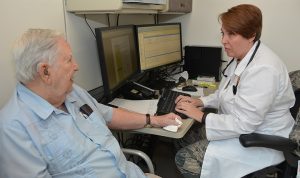 Doctors who use a computer during a consultation risk appearing less compassionate and less professional than their peers who do an old-school face-to-face consultation and take notes while seeing a patient, a US study suggests.
Doctors who use a computer during a consultation risk appearing less compassionate and less professional than their peers who do an old-school face-to-face consultation and take notes while seeing a patient, a US study suggests.
The findings come from a randomised trial in which 160 palliative care cancer patients were presented with two scenarios on video in which actors role-played a physician-patient interaction.
Both consultations had identical dialogues, but in one the physician used a computer to access patient information and type notes, while in the other the doctor only used a pen and notepad.
When asked to rate the physicians’ levels of compassion, communication and professionalism, doctors who used paper and pen scored better in all three areas than the doctors who used a computer.
Compassion scores were rated 21 vs 4 for face-to-face vs computer-using physicians, communication skills scored 68 vs 53 while professionalism ratings were 20 vs 15, respectively.
Additionally, most patients (75%) preferred the physician who did not use the computer.
“One possible explanation for our findings is that patients might value undivided attention and might perceive physicians who engage in [computer use] as more distracted,” said study author Dr Ali Haider from the Department of Palliative Care, Rehabilitation and Integrative Medicine at the University of Texas MD Anderson Center in Houston.
The patients’ negative perception may have reflected physicians’ behaviours using a computer rather than the presence of the computer in the consultation, they added.
“Therefore, proper optimisation of the examination room comuter and clinicians’ training might improve patients’ perception,” they suggested.
“Because current health care delivery necessitates the use of electronic health records, future studies focusing on strategies that can mitigate the negative effects of the [computer] use on physician-patient communication are imperative,” they added.
The findings are published in JAMA Oncology.